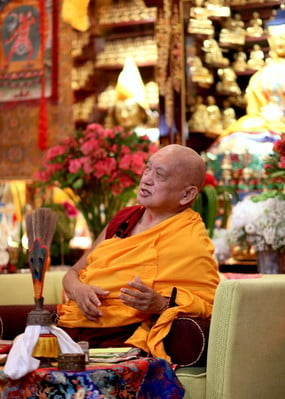You can give money if you have it, and if it is possible. It is not good to refuse to pay the money. If you are going to help the girl, this is also helping your brother. Think in a Dharma way; don't think in a worldly way, because this is just negative karma and then it becomes one more cause for rebirth in the lower realms—and also in the upper realms—where there is so much suffering.
This girl has been your mother, your father, your brother, your husband, your wife and your dear friend numberless times. She has also been your enemy numberless times and she has been a stranger numberless times. It is also your past karmic debt that you have to pay this money this time.
Your brother should wear the protection [amulet], the mantra Liberating From Bondage of Body, Speech and Mind.
The Dharma way is to think of the kindness of sentient beings, [who are the cause of] all your past, present and future happiness—the happiness of the higher realms and ultimate happiness, liberation from samsara and the total cessation of all the obscurations and completion of all the realizations, full buddhahood.
Sentient beings are the most kind, most dear, most precious wish-fulling ones for you, therefore make charity, not because he is your brother or your relative now, which is just for a very short time. This is not only the motivation of Dharma, but also bodhicitta motivation.
You should know that karma is definite, which means it definitely brings the result. From virtue the result is definitely happiness and from nonvirtue the result is definitely suffering.
A suffering result now comes from nonvirtue, if the nonvirtue is not completely purified and if it hasn’t met the conditions that make it extinct. Similarly with virtue, [the result is happiness] if it’s not destroyed by heresy, anger and so forth.
The second outline of karma is that it is expandable. You have to know that by making charity just one time you will experience the result for many lifetimes, for many eons. This is what you have to really know, to recognize. Happiness is not just received one time from virtue and then it is finished. This is what many people may think, but it’s not correct. We experience the result for eons. We have to experience the result, happiness, for eons. Similarly, we experience suffering as a result of nonvirtue. It’s not just one time that we experience it and it’s finished; we have to experience it for eons.
We have to understand that if the karma is not created then the result never happens. If the karma is created then the resultant suffering or happiness—whether great or small——never gets lost, even if it was created billions, zillions, trillions of years ago. We still have to experience the result of negative karma from billions, zillions, trillions of years ago, not just from this past life.
People wonder why in the beginning they have a beautiful body and then suddenly it becomes defective, or they have a lot of mental and physical suffering. So much unimaginable suffering happens, which could be from karma created numberless eons ago. People are very surprised, and they think, “Oh, I haven’t done bad things in this life, so why am I experiencing this now?” Most people think it is just [experienced in] one life. Maybe some people think of karma created from past lives, but most don’t think it can be karma created billions or zillions of eons ago, numberless eons ago. Most people don’t think like that.
In the Tengyur—the commentaries of the great pandits from Nalanda on the Buddha’s teachings in the Kangyur—the Buddha said:
Any sentient being who, during the period of my teachings,
Makes charity well (even if the material is the size of a hair)
For 80,000 eons there will be great results of great enjoyment:
No pain, no disease, and enjoyment of happiness.
Like that, one will be enriched with the desirable things.
At the end you can actually achieve the result—the peerless cessation and completion (enlightenment).
After hearing that there is the great result, who wouldn’t want to collect merit?
There is also a quote similar to this in the Arya Sanghata Sutra by the Buddha.
With much love and prayers ...





























